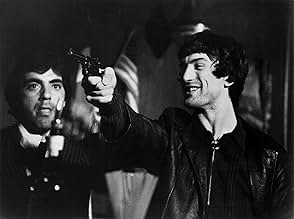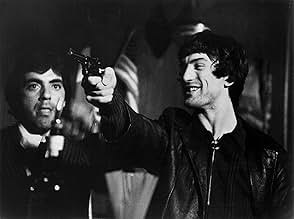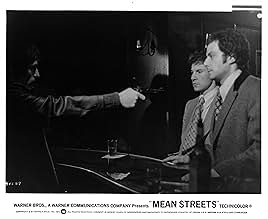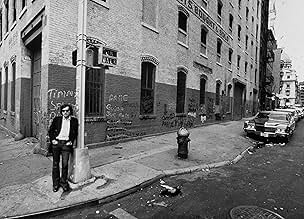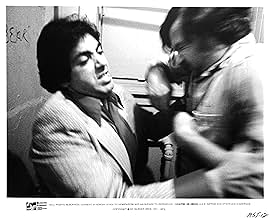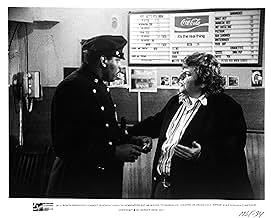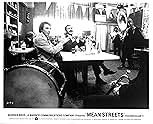Un matón de poca monta aspira a subir de rango en la mafia local.Un matón de poca monta aspira a subir de rango en la mafia local.Un matón de poca monta aspira a subir de rango en la mafia local.
- Dirección
- Guión
- Reparto principal
- Premios
- 5 premios y 5 nominaciones en total
Victor Argo
- Mario
- (as Vic Argo, Victor Argo)
Murray Moston
- Oscar
- (as Murray Mosten)
Reseñas destacadas
Mean Streets has all the characteristics we have come to associate with Scorsese - the fluid camerawork, the expressionistic lighting, the sudden explosions of violence, the eclectic soundtrack. In later films, he took cinema to new heights with the flowering of his technical skills and the broadening of his material, but Mean Streets remains unsurpassed for the emotional intensity which only a young director, passionate about film and intent on making a personal statement, could achieve.
The theme of the film is contained in the famous first line 'You don't make up for your sins in church; you do it in the streets' (a Scorsese voice-over). An extended preface which delineates the nature of the film and its characters before the narrative begins includes brief cameo scenes introducing the four protagonists (a much copied device: see, for example, Trainspotting).
Scorsese's alter-ego is played as in the earlier 'Who's That Knocking At My Door?' by Harvey Keitel, giving the performance of his young life. He is Charlie, a junior member of a Mafia family who collects debts and runs numbers, but who also has aspirations to sainthood. The other key figure is his anarchic friend, Johnny Boy, played with ferocious energy by de Niro.
Charlie is introduced coming out of confession, dissatisfied with his penance. Reciting words doesn't mean anything to him and he can't believe that forgiveness could come so easily. Deliberately burning his hand in a candle flame is a more effective reminder of the pain of hell. The camera follows Charlie from the altar into Tony's bar, a red-lit inferno, and when Johnny Boy comes in, to the tune of Jumping Jack Flash, Charlie recognises that this is the form his penance will take. Johnny Boy is the cross he must bear. 'You send me this, Lord' he says resignedly.
Johnny Boy's irresponsibility and impulsiveness make him everything Charlie, with his controlled, anxious, guilt-ridden persona, is not. The argument which follows in the back room about Johnny Boy's debts deserves its reputation as one of the great scenes in seventies cinema.
Charlie's life moves in well worn, claustrophobic circles. Hardly anyone outside his immediate circle appears in the film and other ethnic groups are viewed with suspicion. The characters seldom appear outdoors or in daylight. Charlie inhabits a world of bars, pool halls and cinemas. In the one scene he appears in sunlight, he looks ill at ease. The suit and heavy overcoat he wears (reflecting his Mafiosi ambitions) look distinctly out of place on a beach. It's significant that in this scene Teresa, his girlfriend, scorns his small-time gangsterism and challenges him to join her in moving away to a new life. But Charlie is trapped by his desire to please his uncle.
Scorsese has said that his choice in adolescence lay between becoming a priest and becoming a gangster and that he failed on both counts. Mean Streets allows him to explore that choice to devastating effect.
The theme of the film is contained in the famous first line 'You don't make up for your sins in church; you do it in the streets' (a Scorsese voice-over). An extended preface which delineates the nature of the film and its characters before the narrative begins includes brief cameo scenes introducing the four protagonists (a much copied device: see, for example, Trainspotting).
Scorsese's alter-ego is played as in the earlier 'Who's That Knocking At My Door?' by Harvey Keitel, giving the performance of his young life. He is Charlie, a junior member of a Mafia family who collects debts and runs numbers, but who also has aspirations to sainthood. The other key figure is his anarchic friend, Johnny Boy, played with ferocious energy by de Niro.
Charlie is introduced coming out of confession, dissatisfied with his penance. Reciting words doesn't mean anything to him and he can't believe that forgiveness could come so easily. Deliberately burning his hand in a candle flame is a more effective reminder of the pain of hell. The camera follows Charlie from the altar into Tony's bar, a red-lit inferno, and when Johnny Boy comes in, to the tune of Jumping Jack Flash, Charlie recognises that this is the form his penance will take. Johnny Boy is the cross he must bear. 'You send me this, Lord' he says resignedly.
Johnny Boy's irresponsibility and impulsiveness make him everything Charlie, with his controlled, anxious, guilt-ridden persona, is not. The argument which follows in the back room about Johnny Boy's debts deserves its reputation as one of the great scenes in seventies cinema.
Charlie's life moves in well worn, claustrophobic circles. Hardly anyone outside his immediate circle appears in the film and other ethnic groups are viewed with suspicion. The characters seldom appear outdoors or in daylight. Charlie inhabits a world of bars, pool halls and cinemas. In the one scene he appears in sunlight, he looks ill at ease. The suit and heavy overcoat he wears (reflecting his Mafiosi ambitions) look distinctly out of place on a beach. It's significant that in this scene Teresa, his girlfriend, scorns his small-time gangsterism and challenges him to join her in moving away to a new life. But Charlie is trapped by his desire to please his uncle.
Scorsese has said that his choice in adolescence lay between becoming a priest and becoming a gangster and that he failed on both counts. Mean Streets allows him to explore that choice to devastating effect.
I was never clear at just why Harvey Keitel was putting himself out on a limb for Robert DeNiro in Mean Streets. Sure he's taken with DeNiro's cousin Amy Robinson still I'm not sure he was worth the effort.
Keitel is a small time hood in Manhattan's Little Italy who's not really into it. DeNiro is another small time hood but he's completely and psychotically out of control. He's borrowed a few grand from local loan shark Robert Romanus and Romanus wants his money. Now during the climax scene DeNiro does ask a relevant question, why after he has borrowed and stiffed everyone in the neighborhood would you lend him any money?
In fact Keitel is all that's standing between DeNiro and gangster retribution. Is it all worth it even for Amy Robinson who is an epileptic and for some reason Keitel's uncle Cesare Danova thinks that disqualifies her as a potential bride.
The story is a bit muddled but the characters especially Keitel and DeNiro are unforgettable. Mean Streets made the career of both of them and of director Martin Scorsese. Keitel has become a valued character player and DeNiro a star with an astonishing variety of roles. In fact next to John Ford/John Wayne, Martin Scorsese/Robert DeNiro is probably the most successful director/player combination in film history.
This must have been a labor of love since Martin Scorsese grew up in Little Italy grown a lot smaller since he was a kid there. No doubt Keitel, DeNiro and the rest are drawn from characters he knew. His mom Catherine Scorsese also makes an appearance as she does in many of her son's works.
I don't think Mean Streets ranks up there with Casino, The Departed, The Aviator and Goodfellas, but it's an interesting work.
Keitel is a small time hood in Manhattan's Little Italy who's not really into it. DeNiro is another small time hood but he's completely and psychotically out of control. He's borrowed a few grand from local loan shark Robert Romanus and Romanus wants his money. Now during the climax scene DeNiro does ask a relevant question, why after he has borrowed and stiffed everyone in the neighborhood would you lend him any money?
In fact Keitel is all that's standing between DeNiro and gangster retribution. Is it all worth it even for Amy Robinson who is an epileptic and for some reason Keitel's uncle Cesare Danova thinks that disqualifies her as a potential bride.
The story is a bit muddled but the characters especially Keitel and DeNiro are unforgettable. Mean Streets made the career of both of them and of director Martin Scorsese. Keitel has become a valued character player and DeNiro a star with an astonishing variety of roles. In fact next to John Ford/John Wayne, Martin Scorsese/Robert DeNiro is probably the most successful director/player combination in film history.
This must have been a labor of love since Martin Scorsese grew up in Little Italy grown a lot smaller since he was a kid there. No doubt Keitel, DeNiro and the rest are drawn from characters he knew. His mom Catherine Scorsese also makes an appearance as she does in many of her son's works.
I don't think Mean Streets ranks up there with Casino, The Departed, The Aviator and Goodfellas, but it's an interesting work.
Like the Irishman long after it, Mean Streets is a gangster film that hones in on the mundanity of it all. The violence is pretty nasty when it happens but for the most part, focusing on the everyday life of these low level gangsters and their struggles in recognisably Scorsese fashion is this film's greatest strength.
Harvey Keitel leads the film with an inner turmoil that's great to witness. Overall, it's a very restrained performance which works so well since he's repressing all of his troubles. Seeing Robert De Niro in a role like this really shows how far he's come as this volatile and juvenile performance is almost unrecognizably him.
As director, co-writer and co-editor, Martin Scorsese has a fully formed vision. His usual themes are present, the editing mostly has the rhythm of his later work and New York is definitely a character in itself. Another signature trait of his work are the needle drops and there's a terrific selection of them on display in this.
Harvey Keitel leads the film with an inner turmoil that's great to witness. Overall, it's a very restrained performance which works so well since he's repressing all of his troubles. Seeing Robert De Niro in a role like this really shows how far he's come as this volatile and juvenile performance is almost unrecognizably him.
As director, co-writer and co-editor, Martin Scorsese has a fully formed vision. His usual themes are present, the editing mostly has the rhythm of his later work and New York is definitely a character in itself. Another signature trait of his work are the needle drops and there's a terrific selection of them on display in this.
Martin Scorsese has made some brilliant movies in his life, but unfortunately this isn't one of them. I can't really call it bad, because the direction and the cinematography just drip with pure talent, but I have some major problems with the plot. Mainly, where the hell is it? The story doesn't just move at a slow pace, it appears to go in incredibly tiring loops. It starts of with Johnny Boy (a solid Robert DeNiro) owing a whole bunch of crooks money, which is a pretty riveting starting point. What does he do about it? What do the crooks do about it? Nothing, and that goes on for two hours. The whole movie appears to be Harvey Keitel endlessly saying he has to pay his debts, to which he refuses, to which he asks it again half an hour later, to which he like, makes up an excuse and goes to the movies, and all of it feels so redundant. The movie finally gets to the point in the end, but that doesn't really save it. It shows the sadness of the bad neighbourhoods in New York wonderfully, but that's really all I can say about it.
Both Robert De Niro and Harvey Keitel are fantastic in Mean streets. I'm not a huge Robert De Niro fan as every time i see him act, i just think to myself that he Robert De Niro trying to be somebody. This is not the case in mean Streets for me. Instead he plays a kid who is young and stupid named Johnny boy. His performance is brilliant and is most likely one of his best. Keitel plays Charlie who looks out for Johhny. The opening line of the film basically tells you everything you would want to know about Charlie.
The film is gritty and shot in a documentary style with several tracking shots being carried out hand held. It takes the film 45 minutes to give you a clear plot and a clear understanding on what going to unfold. The last 20 minutes is directed perfectly with a palpable sense of suspense and is clearly the best ending you can give to this film. One negative would be that in the first half there literally no set pieces . Not a lot happens but saying this you get a clear understanding and fully engaged with the characters which makes the last 20 minutes outstanding.
It not the best film that Scorese has ever made but it clear by watching this that Mean Streets was his main starting point to his successful career
The film is gritty and shot in a documentary style with several tracking shots being carried out hand held. It takes the film 45 minutes to give you a clear plot and a clear understanding on what going to unfold. The last 20 minutes is directed perfectly with a palpable sense of suspense and is clearly the best ending you can give to this film. One negative would be that in the first half there literally no set pieces . Not a lot happens but saying this you get a clear understanding and fully engaged with the characters which makes the last 20 minutes outstanding.
It not the best film that Scorese has ever made but it clear by watching this that Mean Streets was his main starting point to his successful career
What Scorsese Film Ranks Highest on IMDb?
What Scorsese Film Ranks Highest on IMDb?
Cinema legend Martin Scorsese has directed some of the most acclaimed films of all time. See how IMDb users rank all of his feature films as director.
¿Sabías que...?
- CuriosidadesFrancis Ford Coppola contributed money to the budget of the film. However, it is rumored that he lent Martin Scorsese $3000 as the Mafia shook him down for using the San Genaro Festival as a backdrop without "permission". It's generally presumed the Mafia uses the all-cash festival to launder money from their ill-gotten gains.
- PifiasYou can see Robert De Niro's mic pack on his back when he gets up to walk to the window at Charlie's house after staying the night.
- Citas
[first lines]
Voice in Charlie's Mind: You don't make up for your sins in church. You do it in the streets. You do it at home. The rest is bullshit, and you know it.
- Versiones alternativasNBC edited 10 minutes from this film for its 1977 network television premiere.
- ConexionesEdited into American Cinema: Film Noir (1995)
- Banda sonoraJumpin' Jack Flash
Written by Mick Jagger (as M. Jagger), Keith Richards (as K. Richards) (uncredited)
By The Rolling Stones
Courtesy of ABKCO Records
Selecciones populares
Inicia sesión para calificar y añadir a tu lista para recibir recomendaciones personalizadas
- How long is Mean Streets?Con tecnología de Alexa
Detalles
- Fecha de lanzamiento
- País de origen
- Sitio oficial
- Idiomas
- Títulos en diferentes países
- Mals carrers
- Localizaciones del rodaje
- Empresas productoras
- Ver más compañías en los créditos en IMDbPro
Taquilla
- Presupuesto
- 500.000 US$ (estimación)
- Recaudación en Estados Unidos y Canadá
- 32.645 US$
- Fin de semana de estreno en EE. UU. y Canadá
- 32.645 US$
- 15 mar 1998
- Recaudación en todo el mundo
- 61.676 US$
- Duración1 hora 52 minutos
- Color
- Relación de aspecto
- 1.85 : 1
Contribuir a esta página
Sugerir un cambio o añadir el contenido que falta

Principal laguna de datos
What was the official certification given to Malas calles (1973) in Japan?
Responde




